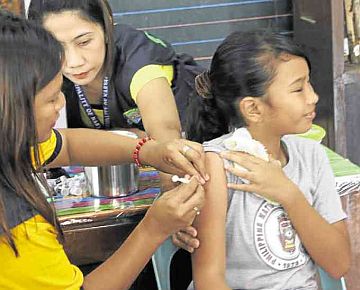
Health workers in Narvacan town in Ilocos Sur province gives a pupil vaccine to protect her from the human papilloma virus.
/Inquirer file photo
More girls from several provinces are expected to benefit from the Department of Health’s (DOH) vaccination program against cervical cancer.
The DOH announced on Monday the expansion of its human papilloma virus (HPV) immunization program as part of its plan to curb the burden of cervical cancer — a preventable disease.
“The program will soon cover more provinces in order to increase the number of beneficiaries — nine-year-old Grade 4 girls in public schools — of its free HPV vaccines.
“Now we are targeting 46 provinces unlike before when only 20 provinces were chosen,” said Dr. Clarito Cairo, DOH medical officer 4 and program manager for cancer prevention and control.
According to him, the DOH, in selecting the beneficiaries, gives consideration to the poorest provinces.
“We also base our selection on the number of new cases, based on data,” said Cairo.
The vaccine protects a girl against four strains of HPV. Nearly 100 percent of cervical cancer are caused by the HPV.
The DOH also urges women to get screened for cervical cancer, which kills more than 12 women daily and is the second leading cancer-related cause of death among Filipino women.
“The tragedy of cervical cancer deaths is that this cancer is preventable and treatable. In fact, in developed countries, cervical cancer is much less common because screening and vaccination are well-established,” said Health Secretary Paulyn Ubial.
In observance of Cervical Cancer Awareness Month this May, the DOH offers free cervical screenings using the VIA (visual inspection using acetic acid) method for women aged 25 to 55 years at selected DOH hospitals nationwide.
“With regular screening, women will know if there are changes in their cervix due to HPV infection, which may eventually progress into cancer,” Ubial explained.
Based on DOH data, every year, more than 6,000 Filipinas are diagnosed with cervical cancer and the disease is usually detected late because the affected women may have no obvious early signs and symptoms./Inquirer.net

